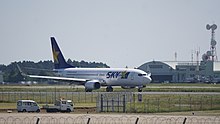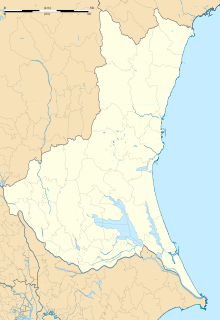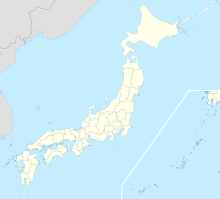Ibaraki Airport
It has been suggested that this article should be split into articles titled Ibaraki Airport and Hyakuri Air Base. (discuss) (September 2023) |
Hyakuri Airfield · Ibaraki Airport Hyakuri Air Base 百里飛行場/百里基地 Hyakuri Hikōjō · Hyakuri kichi | |||||||||||||||
|---|---|---|---|---|---|---|---|---|---|---|---|---|---|---|---|
 | |||||||||||||||
| Summary | |||||||||||||||
| Airport type | Military/Public | ||||||||||||||
| Operator | JASDF | ||||||||||||||
| Serves | Mito, Japan | ||||||||||||||
| Location | Omitama, Ibaraki, Japan | ||||||||||||||
| Elevation AMSL | 107 ft / 33 m | ||||||||||||||
| Coordinates | 36°10′54″N 140°24′53″E / 36.18167°N 140.41472°E | ||||||||||||||
| Website | Ibaraki Airport | ||||||||||||||
| Map | |||||||||||||||
 | |||||||||||||||
| Runways | |||||||||||||||
| |||||||||||||||
| Statistics (2015) | |||||||||||||||
| |||||||||||||||
Source: Japanese Ministry of Land, Infrastructure, Transport and Tourism[1] | |||||||||||||||


Ibaraki Airport (茨城空港, Ibaraki Kūkō) is an airport in the city of Omitama, Ibaraki Prefecture, Japan. It also serves as an air base for the Japan Air Self-Defense Force (JASDF) under the name Hyakuri Air Base, and is the closest fighter base to Tokyo. The airport was known as Hyakuri Airfield (百里飛行場, Hyakuri Hikōjō) prior to March 2010, when civil aviation operations began.[2]
The airport is located about 85 km (53 mi) north of Tokyo, and is intended to serve as a low-cost alternative to Tokyo's larger Narita and Haneda airports. Built as a result of large public investment, the airport has been criticized as being a symbol of wasteful government spending and as being unnecessary, opening with only one flight per day.[3]
As of 2023, a total of eight routes operate from the airport, all by low-cost carriers.[4] One advantage of Ibaraki is its closer access to Tsukuba Science City (via roadway), which has the highest concentration of technology firms in Japan. The airport currently has no advantage over Narita airport in public transport into Tsukuba, with both taking 1 hour.[5]
In May 2020, in order to attract more foreign visitors, Ibaraki Prefectural Government planned to adopt the English nickname "Tokyo Ibaraki International Airport" for overseas promotion.[6][7] However, due to the overwhelming opposition, the government ultimately chose the name "Ibaraki International Airport" in June 2020.[8]
History
[edit]As a military base
[edit]The airfield was first developed by the Imperial Japanese Navy in 1937, with much of the land claimed from local farmers under the orders of Emperor Hirohito. Unlike many other Japanese military bases, it did not become a US base during the occupation. After the end of World War II, the locals reclaimed the land and resumed farming the land. The base was reopened in 1956 by the Japan Air Self-Defense Force, which took control of the land once again. Many farmers who live around the base have refused to sell their lands to the government to enable expansion of the airfield.[9]
In September 1976 the MiG-25 Foxbat flown by the defecting Soviet pilot Victor Belenko to Hakodate Airport in Hokkaido was moved to Hyakuri by a US Air Force C-5 Galaxy. Despite strong Soviet protests, the Soviet aircraft was extensively examined and disassembled before being returned to the Soviet Union.[10]
In February 1998 Chi Haotian, the-then Chinese defense minister, visited the base among other military sites in Japan.[11]
In 2001 aircraft from Hyakuri were involved in intercepting Tupolev Tu-22M bombers of the Russian Air Force that had entered Japanese airspace.[12]
In 2005 Japan and the US agreed to move some USAF F-15 fighter drills from Kadena Air Base in Okinawa to decrease the burden on that prefecture. Drills were to be moved to five other bases around the country - Chitose in Hokkaido, Hyakuri in Ibaraki Prefecture, Komatsu in Ishikawa Prefecture, Tsuiki in Fukuoka Prefecture and Nyutabaru in Miyazaki Prefecture.[13] In 2005 USAF F-15 aircraft from Kadena Air Base in Okinawa deployed to the base as part of exercise Keen Sword 2005.[14]
In April 2006 the Omitama city assembly unanimously opposed the F-15 training taking place at Hyakuri.[15]
In May 2006 the US and Japan agreed to transfer part of the drills to the bases including Hyakuri with the US deploying to each base two or three times per year from 2007,[16][17] with Japan footing 75% of the cost.[18] US military personnel sometimes use the base for training or exchange programs.[19][20][21] US Navy aircraft sometimes visit the base also, with F/A-18E Super Hornets of VFA-195 based at Naval Air Facility Atsugi in Kanagawa Prefecture deploying there briefly in 2016.[22]
In January 2016 the JASDF used three Kawasaki T-4 trainers from the airport to collect radioactive material after North Korean's fourth nuclear test, which North Korea claimed was a hydrogen bomb test.[23]
In October 2017 an F-4EJ Kai Phantom II of 302nd Tactical Fighter Squadron caught fire on the ground after its landing gear malfunctioned. There were no injuries.[24][25][26][27]
Hyakuri Peace Park
[edit]
The Hyakuri Peace Park is located in the air base. The main taxiway used by the air base goes around it.[9]
Air Show
[edit]Hyakuri Air Base holds an annual air show in December featuring displays of military aircraft from the base as well as other equipment. There is a display by Blue Impulse, the JASDF aerobatic team.[28][29]
As a civilian airport
[edit]
In March 2010, after a 22 billion yen ($243 million) local and national government investment, the airfield was renamed to Ibaraki Airport, and civil aviation operations began. At the time of opening, Ibaraki offered two flights, an Asiana service to Seoul, South Korea, and to Kobe in western Japan, by Skymark Airlines. The original plans for a three-story terminal with separate arrivals, departures, and sightseeing levels was scrapped by the governor of Ibaraki Prefecture, Masaru Hashimoto, who ordered the building to be reduced to one story in height, to reduce costs. The airport will eschew jetways, with passengers boarding planes from the tarmac. Additional cost-cutting measures, intended to allow the airport to charge lower landing fees than those at Narita and Haneda, include the use of aircraft parking procedures that reduce or eliminate the need for pushback tractors, and the possibility of having the passengers carry their own luggage to the aircraft, a practice used at some regional airports in the United States.[30]
Interest in the airport has been expressed by the Malaysian carrier AirAsia X[31][32][33] as well as Korean airline Asiana,[34] but only the latter has committed to flying out of the airport on a fixed basis.[35] TransAsia Airways has committed to flights to and from Taipei's Taoyuan Airport on a semi-regular basis from March to May. During the May holiday, charters to Guam, Cebu, Bali, and Hainan will operate out of the airport. Also, China-based low-cost carrier Spring Airlines has chosen this airport as its Tokyo-area destination with its recent approval for international flying. It planned to run three charter flights a week from Shanghai-Pudong starting from about the end of July 2010 for about two months, switching to scheduled flights at the end of this period (around the end of the World Expo).[36] However, it has started selling seats on the charters in the same manner as a normal flight since September 2010, much like the early Hongqiao-Haneda "scheduled charters" and has operated the flight as a scheduled service starting from 2011. In addition, it has now increased service to five flights a week.
As of March 2011, flights to Shanghai were operating at 80% capacity and the flights to Kobe at 50% capacity.[37] On March 11, 2011, the roof of one of the terminals came down in the 2011 Tōhoku earthquake and tsunami but was quickly repaired.
A total of 860,000 people visited the airport terminal in its first year[38] with 203,070 of those being traveling passengers.[39]

Asiana Airlines ceased operations from Incheon International Airport to Ibaraki Airport following the 2011 disaster.[40]
In August 2013, Myanmar Airways International signed a letter of intent to begin thrice-weekly direct "program charter" service between Yangon and Ibaraki by December 2013. MAI stated that they wished to avoid the overcrowding of Narita and Kansai Airport, and that Ibaraki Prefecture waged a year-long lobbying campaign which included visits to the Myanmar ambassador in Tokyo. This flight was to be the second regularly-scheduled flight between Japan and Myanmar (the first being All Nippon Airways service between Narita and Yangon).[40] However, as of 2017, the program charter service between Yangon and Ibaraki has not yet started.
Airlines and destinations
[edit]| Airlines | Destinations |
|---|---|
| Aero K | Cheongju (begins 3 December 2024)[41] |
| Skymark Airlines | Fukuoka, Kobe, Naha,[42] Sapporo–Chitose |
| Spring Airlines | Shanghai–Pudong, Xi'an (resumes 24 December 2024)[43] |
| Tigerair Taiwan | Taipei–Taoyuan[44] |
Ground transportation
[edit]Bus service
[edit]Buses connect Ibaraki Airport with various train stations in Ibaraki prefecture and Tokyo station.
- City buses
- Passengers who stay at a hotel in Ibaraki are entitled to a free single journey on one of the following buses:
| Bus stop | Bus | Via | Destination | Company |
|---|---|---|---|---|
| No.1 | Ibaraki-Kūkō Renraku bus[45][46] | Tamari Station・Ogawa Station・Tamatsukuri Station | Ishioka Station[47] | Kantetsu-Green bus |
| Hokota-Ibaraki Kūkō Line[48] | Hokota Station | Shin-Hokota Station[49] | ||
| No.2 | Ogawa Station-Ibaraki-Kūkō-Mito Station Line [50][51] | Kenchō-mae・Mito Station | Yoshizawa-Shako |
- Highway buses
| bus stop | Name | Via | destination | Company | Note |
|---|---|---|---|---|---|
| No.2 | Ibaraki-Kūkō↔Mito Station Line[52][51] | Non stop | Mito Station | Kanto Railway | |
| Ibaraki-Kūkō↔Hitachi-ota Highway buses Terminal(Hitachi-Ōta Station)Line[53] | Mito Station・Katsuta Station・Tokai Station | Hitachi-ota Highway buses Terminal (Hitachi-Ōta Station) | Ibaraki Kotsu | ||
| No.3 | Ibaraki-Kūkō↔Tokyo Station Line[52] | Non stop | Tokyo Station | Kanto Railway | ※[54] |
| No.4 | Ibaraki-Kūkō↔Tsukuba Center Line[55][46] | Shimo-Hirooka (You are able to transfer onto bus routes bound to Tsuchiura Station or Tokyo Station, Mito Station (Ibaraki)) | Tsukuba Center (Tsukuba Station) | ||
| the start of Mount Tsukuba trail (Tsukubasan-Shrine) | Runs only when there is a flight<Ibaraki-airportーIncheon International Airport (Eastar Jet)> |
Japan Air Self-Defense Force
[edit]
As of 2017, all of the remaining F-4 Phantom II aircraft belonging to the JASDF operate from Hyakuri Air Base. As such it has become popular among aviation photographers and enthusiasts.[56][57][58][59][60][61][62]
Central Air Defense Force
[edit]Air Rescue Wing
[edit]References
[edit]- ^ "Ibaraki Airport" (PDF). Japanese Ministry of Land, Infrastructure, Transport and Tourism. Archived from the original (PDF) on 21 October 2016. Retrieved 7 January 2017.
- ^ Cooper, Chris (2008-12-03). "Opening date". Bloomberg.com. Retrieved 2014-08-03.
- ^ Buerk, Roland (2010-03-11). "Japan opens 98th national airport in Ibaraki". BBC News. Retrieved 2014-08-03.
- ^ Airports tap budget airline benefits Archived March 25, 2012, at the Wayback Machine
- ^ "University of Tsukuba | Access/Campus map | Directions to Tsukuba Campus". www.tsukuba.ac.jp. Archived from the original on 2007-11-19.
- ^ "Experts blasted for wanting to add 'Tokyo' to name of Ibaraki airport northeast of capital". Mainichi Daily News. June 1, 2020.
- ^ "Ibaraki Airport mulls name change to "Tokyo Ibaraki Airport" despite not being in Tokyo". Sorannews24. 1 June 2020.
- ^ "茨城空港、海外向けの愛称はTokyoなしの「Ibaraki International Airport」に". Impress (in Japanese). 5 June 2020.
- ^ a b Gilionna, John M. (2009-09-10). "Farmers Wage Turf Battle With Japan Air Force". Los Angeles Times.
- ^ UNCLAS State Message 239736, U.S. State Department, 27 September 1976.
- ^ Hashimoto meets Chinese defense minister February 5, 1998 Japan Times Retrieved February 4, 2017
- ^ Russian military planes enter Japanese airspace February 15, 2001 Japan Times Retrieved October 2, 2017
- ^ Kadena F-15 drills to be transferred to five ASDF bases October 29, 2005 Japan Times Retrieved February 4, 2017
- ^ So long Sword US Air Force Retrieved February 4, 2017
- ^ Japanese city opposes moving Kadena jet training April 14, 2006 Stars and Stripes Retrieved February 4, 2017
- ^ SDF bases to take on U.S. F-15 drills December 29, 2006 Japan Times Retrieved February 4, 2017
- ^ F-15 combat drills spare Kadena March 6, 2007 Japan Times Retrieved February 4, 2017
- ^ Japan to foot 75% of costs to transfer U.S. drills January 12, 2007 Japan Times Retrieved February 4, 2017
- ^ Airmen interact with the local community at ATR Hyakuri October 6, 2009 October 6, 2009] Pacific Air Forces Retrieved February 2, 2017
- ^ U.S. and Japan want expanded NCO exchange Immersion on Hyakuri Air Base an eye-opener for Misawa airmen December 20, 2005 Stars and Stripes Retrieved February 4, 2017
- ^ Bilateral exercise aids cross-cultural exchange February 2, 2007 Stars and Stripes Retrieved February 4, 2017
- ^ VFA-195 Trains with Japan Air Self-Defense Force April 20, 2016 Archived February 6, 2017, at the Wayback Machine Navy.mil Retrieved February 5, 2017
- ^ Japan deploys planes to collect radioactive material after North Korean nuclear test January 6, 2016 Japan Times Retrieved February 4, 2017
- ^ "Japanese fighter jet catches fire, no one hurt". Mainichi Shimbun. October 18, 2017. Archived from the original on October 18, 2017. Retrieved October 18, 2017.
- ^ "第302飛行隊F-4EJ改、百里基地でタキシング中に出火 搭乗者は無事". Flyteam.jp (in Japanese). October 18, 2017. Retrieved October 18, 2017.
- ^ [茨城・百里基地の空自戦闘機が出火=離陸直前、操縦士にけがなし. Jiji (in Japanese). October 18, 2017. Archived from the original on October 18, 2017. Retrieved October 18, 2017.
- ^ "Japanese fighter jet catches fire before takeoff from base in Ibaraki Prefecture". Japan Times. October 18, 2017. Retrieved October 19, 2017.
- ^ JASDF Hyakuri airshow Retrieved April 24, 2017
- ^ Hyakuri Flying-Wings Retrieved April 24, 2017
- ^ In Japan, No-Frills Airport Lures Bargain Players
- ^ 茨城空港:エア・アジアX、就航に意欲 県と自民県連幹部、マレーシア訪問 /茨城 - 毎日jp(毎日新聞) Archived 2012-07-12 at archive.today (in Japanese)
- ^ マレーシア格安航空のエア・アジアXが日本就航 (日本経済新聞, 20 May 2008) Archived 3 June 2008 at the Wayback Machine (in Japanese)
- ^ 東南アジアの格安航空 日本就航へ虎視眈々 徹底合理化で好調維持 (14 June 2008) Archived 15 June 2008 at the Wayback Machine (in Japanese)
- ^ "Asiana Airlines to fly Ibaraki-Incheon route". Tmcnet.com. Retrieved 2014-08-03.
- ^ DESCENT INTO JAL BANKRUPTCY / Unpopular airports albatross around necks
- ^ 中国の格安航空会社、茨城空港に上海便就航表明 (7 June 2010)[dead link]
- ^ Kyodo News, "Ibaraki Airport fails to take off", Japan Times, 10 March 2011, p. 7.
- ^ "Ibaraki Airport marks first year | The Japan Times Online". search.japantimes.co.jp. Archived from the original on 2011-03-13.
- ^ 平成22年空港管理状況調書(PDF形式) Archived September 18, 2011, at the Wayback Machine
- ^ a b "茨城空港にミャンマー便就航へ". 日本経済新聞. 19 August 2013. Retrieved 20 August 2013.
- ^ "Aero K NW24 Network Changes".
- ^ "Skymark Airlines Adds Ibaraki – Okinawa Service from late-April 2016". 7 March 2016. Retrieved 7 March 2016.
- ^ "Spring Airlines NW24 Xi'An International Service Expansion". Aeroroutes. Retrieved 30 October 2024.
- ^ "Tigerair Taiwan NS23 Japan Operations – 10MAR23". Aeroroutes. Retrieved 10 March 2023.
- ^ Kantetsu-Green bus
- ^ a b "The one-way fare for passengers who stay at hotel in Ibaraki is free". Archived from the original on 2020-10-30. Retrieved 2020-10-03.
- ^ Ishioka Station on the JR Jōban Line is the closest serviced station by bus.Ishioka Station Archived 2014-08-10 at the Wayback Machine from there, journey time to Tokyo station is one hour 40 minutes to two and half hours by railway, depending on exact route.
- ^ Access
- ^ Please change buses that Rose Liner(MitoーShin-HokotaーNarita International Airport) bound for Narita Airport at Shin-Hokota Station.
- ^ Kantetsu-Green bus
- ^ a b "The one-way fee for passengers who stay at hotel in Ibaraki is free". Archived from the original on 2020-10-30. Retrieved 2020-10-03.
- ^ a b Free Wi-Fi
- ^ "茨城空港線 | 空港バスのご案内 - 茨城交通".
- ^ Additionally, there is a shuttle bus (operated by Kantō Railway) which serves as a direct connection between Tokyo Station and the airport. The journey time is approximately 2.5 hours (1 hour 40 min. from Tokyo to Ibaraki), reservations are required, but in the case that seats are empty, don't have to require.The fee for airline passengers used to be 500 yen, currently, they are 1530 yen(adult)
- ^ Ibaraki-Kūkō↔Tsukuba Center Line
- ^ Japan Tour 2011 Jet Wash Aviation Photos Retrieved February 1, 2017
- ^ Hyakuri Airshow 2012 Archived 2018-06-26 at the Wayback Machine Touchdown-Aviation Retrieved February 1, 2017
- ^ Phantom Heaven - Hyakuri Airbase June 2013 Jet Thrust Images Retrieved February 1, 2017
- ^ This Video Will Literally Bring You To The Paradise Of Phantoms! January 25, 2017 The Aviationist Retrieved February 1, 2017
- ^ Land of the Rising Phantoms Archived 2015-02-06 at the Wayback Machine Fence Check Retrieved February 1, 2017
- ^ Hyakuri Air Force Base, Japan Archived 2017-02-06 at the Wayback Machine Arizona Aviation Photographers Retrieved February 5, 2017
- ^ Hyakuri, Japan Frontline Aviation Retrieved February 5, 2017
External links
[edit]![]() Media related to Ibaraki Airport at Wikimedia Commons
Media related to Ibaraki Airport at Wikimedia Commons
![]() Media related to Hyakuri Air Base at Wikimedia Commons
Media related to Hyakuri Air Base at Wikimedia Commons
- Official website
- 百里飛行場民間共用化 (Omitama City) (in Japanese)
- いばらきの空港・百里飛行場/茨城県企画部空港対策室 (Ibaraki Prefecture) (in Japanese)
- 関東地方整備局予算の概要 (Ministry of Land, Infrastructure and Transport) (in Japanese)
- 国土交通省関東地方整備局港湾空港部 (Ministry of Land, Infrastructure and Transport) (in Japanese)
- Current weather for RJAH at NOAA/NWS
- (in Japanese), Japan Air Self-Defense Force


